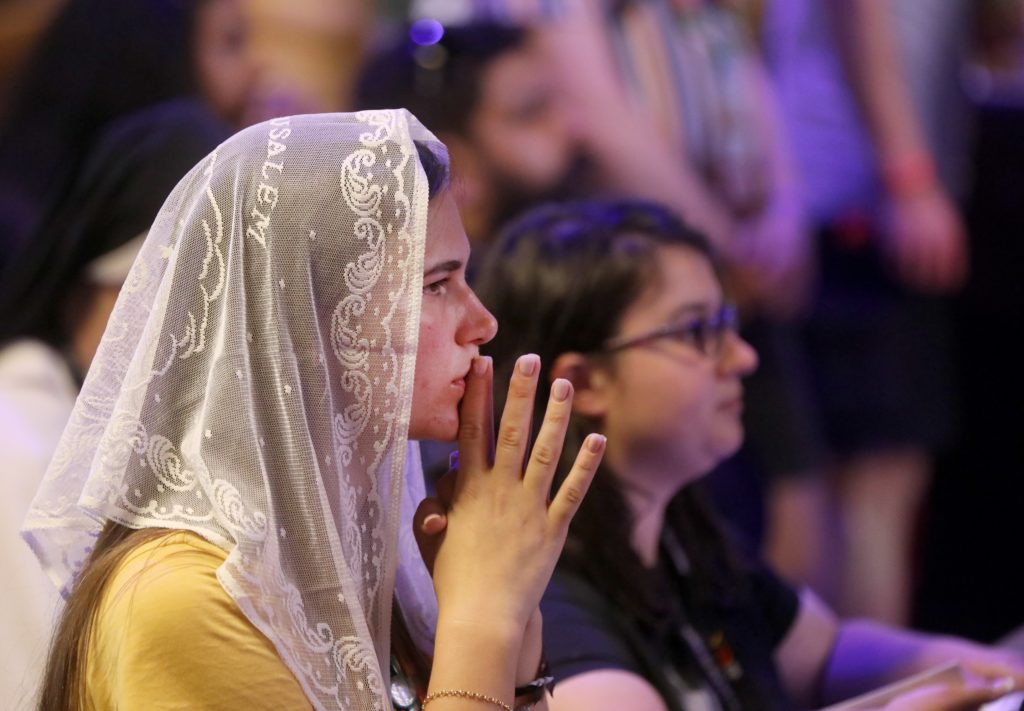Too many years ago, I attended Mass one Sunday in a Catholic church in Kuala Lumpur, Malaysia. The Mass was celebrated in Chinese, of which I understood few words. Yet the Mass was familiar to me. I knew when to stand, kneel, and sit. I recognized the Liturgy of the Word, the Offertory, the Consecration, and when to proceed to receive the Eucharist.
I felt the same in a crowded Sunday Mass I attended earlier this year in Paris. There is a unity in the liturgy of the Roman Rite, whatever language in which it is celebrated.
This unity is addressed in the working document of the upcoming synod. “It is through shared liturgical action, and in particular the eucharistic celebration, that the Church experiences radical unity, expressed in the same prayer but in a diversity of languages and rites,” the document said.
This “radical unity” within diversity is elemental to the celebration of the Eucharist, yet at various times over the past few decades, it has become tempting even in our liturgies to focus on our differences of behavior, allowing them to drive us apart.
On the ground floor of the five-story building that houses the U.S. Conference of Catholic Bishops, there is a small, rather austere chapel where daily Mass is celebrated. Many years ago, long before I worked there, I attended one of those daily Masses. I was surprised at the disorder I saw at that time. Some people knelt during the Consecration. Some stood. Some recited the masculine pronoun for God, some emphatically did not. I felt a bit like I was worshipping amid a liturgical riptide, different ideological currents bumping into one another, everyone making their individual statements.
That no longer describes those daily Masses, but fast forward to our post-COVID present and there seem to be other rip currents pulling us in different directions at many parishes. A few women wear veils; most do not. Some receive Communion in the hand. Others on the tongue. Some on their knees and on the tongue. A few prefer not to receive from an extraordinary minister of holy Communion. Some parishes are bringing back Communion rails, but even here there is a bit of visual chaos: some kneel, some stand, some receive in the hand, some on the tongue.
More worrisome from a pastoral point of view in terms of the unity we strive for is that people of all stripes are sensitive to being judged for the choices they make regarding this central act of our worship. One group may feel itself judged as uber-pious, but judge others as too casual, and vice versa.
The judgments do not stop there: The vestments worn, the songs sung, the incense burnt, the amount of Latin used or avoided, the Kiss of Peace, the addition of the St. Michael Prayer at the end of Mass. These are all potential pain points that may drive people to seek parishes where they feel more comfortable. At the very least, they are distractions to our own spiritual equanimity.
We are all brothers and sisters in baptism, yet we allow our differences to divide us. This disunity can also impact how effectively we evangelize the larger culture. The great unrequited hunger of our age is for community, something that our Church should be able to satisfy. Yet when we turn everything from how to receive Christ to whether we support this pope or that pope into a point of division, we ourselves become roadblocks to community.
If our goal is to win converts for a behavior or way of acting rather than to Christ and his entire community, then we risk emphasizing our disunity rather than our community.
In all of this, I admit that I can be as “judgy” as the next person. At times I might wish the pastor or bishop or Rome would simply mandate uniform behavior, but such a mandate would more likely drive us further apart.
Perhaps a better solution would be to start by looking into our own hearts. Are we being the judgmental ones? Are we allowing ourselves to feel judged? How can we embrace our differences, or at least pay them no heed?
More importantly, how do we recover a sense of Christian community that should characterize our parish life? Our baptismal bond makes us brothers and sisters in the most profound spiritual sense, but it is not sustained without effort. Being a true community, unified in our diversity, means that the parish has to become more to us than our local spiritual filling station, good for an hour drop-by once a week.
The synodal document says that our desire for communion means “taking on the incompleteness of being able to live unity in diversity.” Maybe that is our challenge, my challenge, now: to see past the differences and to celebrate what we share.

